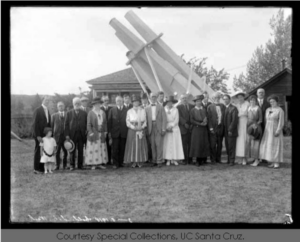Free Live Streaming Silicon Valley Lecture: Lick Observatory During Pandemics: 1918 and 2020

On Wednesday, Mar. 10, 2021 at 7 pm PT, Lick Observatory astronomer Dr. Elinor Gates will give a free, illustrated, non-technical talk on:
”Lick Observatory During Pandemics: 1918 and 2020”
The talk is part of the Silicon Valley Astronomy Lecture Series (through Foothill College), now in its 21st year.
Lick Observatory, the first continuously inhabited mountain-top observatory in the world, has been doing ground-breaking research since its opening in 1888. 30 years after Lick Observatory established itself as a leader in astronomical research, the 1918 Spanish Flu pandemic hit the United States. Research, while hampered by the conditions at the time, continued with the dedicated efforts of William Wallace Campbell, Heber Curtis, and other notable astronomers of the day. Dr. Gates will highlight the hot topics of research being done in 1918 and how the observatory persevered through the difficult conditions at the time.
Today we are experiencing another devastating pandemic — COVID-19. Shelter-in-place orders and shutdowns have limited Lick Observatory operations. Additionally, the SCU wildfire disrupted operations and almost destroyed the observatory, creating additional challenges for staff and researchers. Dr. Gates will describe how they have dealt with the challenges and adapted to continue as much research and data acquisition as possible, particularly in the areas of supernovae, exoplanet, and SETI research, as well as commissioning new telescopes and instruments.
-------------------------------------------
Dr. Elinor Gates is a staff astronomer at Lick Observatory specializing in laser guide star adaptive optics and near infrared camera instrumentation and observations. Before moving to Lick Observatory, she worked at the Smithsonian Astrophysical Observatory, IAU Minor Planet Center, the National Radio Astronomy Observatory, and the Air Force Phillips Laboratory. Dr. Gates’ current research interests are studying quasars and their host galaxies, discovering dust obscured quasars, and measuring the masses of quasar and AGN central black holes. Asteroid (2650) Elinor is named in Dr. Gates’ honor.
The lecture is co-sponsored by:
* The Foothill College Science, Tech, Engineering & Math Division
* The SETI Institute
* The Astronomical Society of the Pacific
* The University of California Observatories (including Lick Observatory).

